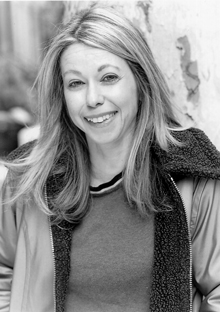Bonnie Friedman's Aha! Moment
"This Is It, My Pet Pachooch!"

Photo: David Bartolomi
I used to yearn for a wake-up call. I thought often about an acquaintance who took a skydiving class; when her parachute didn't open, she fell more than a mile, crashing into a field. Miraculously, she lived. And as soon as her bones healed, she changed her entire life: divorced her husband, moved with her children to a house down the road, and let herself pursue what she really wanted. Of course, I didn't want the mile-long fall (or the divorce), but I did want this woman's visceral understanding that life is short and mustn't be wasted.
Even after I was struck by a car and sent flying four feet through the air, though, I wasn't shocked into transformation. I picked myself up, limped home, and continued to ignore a certain unhappiness in my marriage. I put off asking my parents for the stories of their childhoods so I could record them. I doggedly did my work and didn't confront problems.
A few years later, when my sister, who had been ill for decades with multiple sclerosis, passed away, I felt surprisingly little: I'd been saying goodbye to her for a long, long time.
But something happened at the funeral home. "Come here," the rabbi said, drawing my family into a side room. My glance fell on a simple pine box. Naturally, there are coffins in funeral homes, I thought—then realized it must be Anita's. It was so small, considering the large woman she'd become. So bare. That's all life ends up as, it seemed to say. My heart flew out of me—oh, Anita! I suddenly missed the girl she'd been, the energetic hiker who sang Girl Scout songs and sipped Tab, who folded newspapers into admirals' hats for us to play at being adventurers. I even missed the wheelchair-bound woman who loved chocolate cake although someone had to feed it to her.
Even after I was struck by a car and sent flying four feet through the air, though, I wasn't shocked into transformation. I picked myself up, limped home, and continued to ignore a certain unhappiness in my marriage. I put off asking my parents for the stories of their childhoods so I could record them. I doggedly did my work and didn't confront problems.
A few years later, when my sister, who had been ill for decades with multiple sclerosis, passed away, I felt surprisingly little: I'd been saying goodbye to her for a long, long time.
But something happened at the funeral home. "Come here," the rabbi said, drawing my family into a side room. My glance fell on a simple pine box. Naturally, there are coffins in funeral homes, I thought—then realized it must be Anita's. It was so small, considering the large woman she'd become. So bare. That's all life ends up as, it seemed to say. My heart flew out of me—oh, Anita! I suddenly missed the girl she'd been, the energetic hiker who sang Girl Scout songs and sipped Tab, who folded newspapers into admirals' hats for us to play at being adventurers. I even missed the wheelchair-bound woman who loved chocolate cake although someone had to feed it to her.



